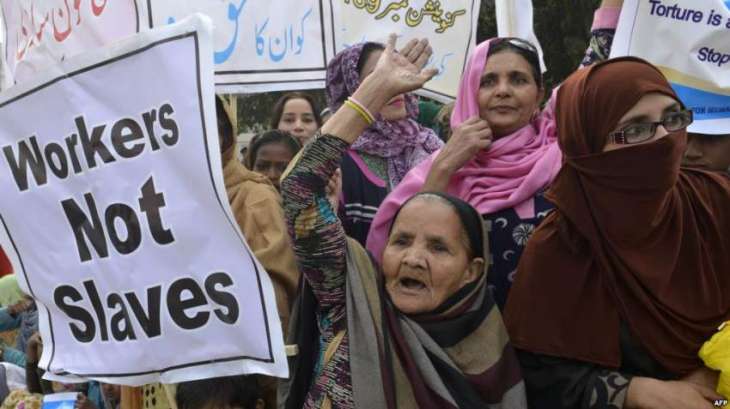International Human Rights Day will be marked on Monday to honor the adoption of the first universal international document on human rights on December 10, 1948.
MOSCOW (Pakistan Point News / Sputnik - 10th December, 2018) International Human Rights Day will be marked on Monday to honor the adoption of the first universal international document on human rights on December 10, 1948.
This commemorative date, aimed at celebrating the Universal Declaration of Human Rights as the common standard of achievement "for all peoples and all nations," was established by the UN General Assembly in 1950.
The Universal Declaration of Human Rights includes a wide range of political, civil, social, cultural and economic rights.
Although the declaration itself is not a legally binding instrument, it has inspired the introduction of more than 80 international human rights instruments, which together constitute a comprehensive legally binding system for the promotion and protection of human rights.
The development of other international agreements was carried out based on the declaration. On December 16, 1966, the International Covenant on Economic, Social and Cultural Rights and the International Covenant on Civil and Political Rights, which came into force in 1976, were adopted by the UN General Assembly.
Concluded under the auspices of the United Nations, four international documents (the Universal Declaration of Human Rights, the International Covenant on Economic, Social and Cultural Rights, the International Covenant on Civil and Political Rights, Optional Protocols to the International Covenant on Civil and Political Rights) are often referred to as the International bill of human rights. On the basis of these international documents, the UN Security Council may impose sanctions against those regimes that commit or condone violations of human rights.
The Office of the High Commissioner for Human Rights is the leading UN entity on human rights. Through the provision of technical expertise and experience, it promotes and protects human rights and implements human rights program within the United Nations. It provides support to states that are primarily responsible for protecting human rights in fulfilling their obligations and helps people to defend their rights.
Since September 1, 2018, Michelle Bachelet has been serving as UN High Commissioner for Human Rights.
The Vienna Declaration and Programme of Action, which was adopted at the World Conference on Human Rights on June 25, 1993, marked the beginning of new efforts to protect and promote human rights.
International cooperation on human rights is complemented by efforts at the regional level, which take into account the political, historical, cultural and economic factors of the region and reflect all of this in the adopted documents. These documents include, in particular, the 1950 European Convention for the Protection of Human Rights and Fundamental Freedoms; the European Social Charter of 1961; the 1969 American Convention on Human Rights; the African Charter on Human and Peoples' Rights from 1981; and the Arab Charter on Human Rights, adopted in 1994.
Human rights in the fields of education, culture and science are covered in the conventions adopted within the framework of United Nations Educational, Scientific and Cultural Organization (UNESCO). In particular, the Convention against Discrimination in Education was adopted by UNESCO on December 14, 1960. The term "discrimination" means distinction, exclusion, limitation or preference, the purpose or effect of which is to nullify or impair equality of treatment in education based on race, color, sex, language, religion, political or other opinion, national or social origin, economic condition or birth.
The development of the concept of human rights has resulted in designation of child's human rights to a special category. In 1959, the United Nations adopted the Declaration of the Rights of the Child, which proclaimed social and legal principles relating to the protection and welfare of children.
On November 20, 1989, the UN General Assembly adopted the Convention on the Rights of the Child. The Convention has 54 articles, which take into account almost all aspects related to the life and status of the child in society. All its provisions are reduced to four fundamental principles that ensure the rights of children: non-discrimination; the best interests of the child; survival, development and protection; participation in the life of society.
The United Nations Prize in the Field of Human Rights was established by the UN General Assembly in 1966. The prize is an honorary award, which is given to individuals and organizations in recognition of outstanding achievement in the promotion and protection of human rights. This prize is awarded every five years on the anniversary of the proclamation of the Universal Declaration of Human Rights. It was awarded for the first time in 1968. Previous winners have included Jimmy Carter, Martin Luther King, Nelson Mandela, Eleanor Roosevelt.
The prize laureates in 2013 were: a Pakistani girl Malala Yousafzai, who defended the right of girls and women to education and was shot by Islamic extremists in an assassination attempt; an anti-slavery activist Biram Dah Abeid; Hiljmnijeta Apuk, who is the defender of persons with disabilities of Kosovo; Finnish human rights activist Liisa Kauppinen, who defends the rights of the deaf people; and Moroccan human rights activist Khadija Ryadi.
The UN General Assembly also awarded the prize to the Supreme Court of Justice of Mexico for its role in the constitutional protection of the human rights of the Mexicans.
The next award ceremony will take place at the UN Headquarters in New York on December 10, 2018, as part of the annual celebration of Human Rights Day.




